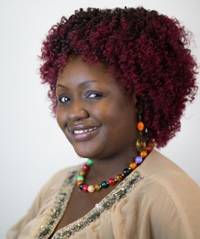Ochola has been with the Kenya Medical Research Institute (KEMRI) in Kisumu, Kenya since 2009. She arrived with a Bachelor’s degree in biomedical sciences from Kenya’s University of Eastern Africa, and soon found she needed
more support. She didn’t have the technical skills for developing good project funding proposals, and she missed out on the networking and mentorship opportunities that exist among senior women in science. |
Provided by Ms Ochola |
Looking back, she explains, “I overcame these challenges by having the courage to ask questions and to get answers from successful senior scientists, both male and female.” Ochola also took advantage of the networking possibilities that emerged
from various conferences and workshops.
Mentoring can make the difference
These career experiences are behind Elizabeth’s TDR proposal to establish a mentoring programme for early women scientists. “It’s important that they approach and seek advice from senior women scientists,” she reinforces, noting that this is where mentoring can make a key difference.
Apart from lacking the skills, Ochola maintained, young women are often unprepared to pursue a research career. “There are few established women at universities in Kenya where aspiring scientists can seek advice, such as how to navigate the professional environment,” she said. Furthermore, many Kenyan universities lack the professional networks to facilitate information exchange.
The TDR grant is not only helping young female researchers to grow in their fields, but also enabling more experienced ones, such as herself, to mentor upcoming scientists. A six-month programme provided final-year women students studying biomedical sciences in five public universities in western Kenya with mentoring support research and manuscript development and grant writing skills, none of which are offered as part of their academic training.
Building on Kenya’s commitment to address gender inequality
Recognizing the country’s under-representation in leadership positions, particularly academic and research institutions, Kenya has taken steps to address gender inequality and, as part of the country’s VISION 2030, has taken a policy to mainstream women in science. This is embedded in the Science, Technology and Innovation Act of 2013.
Increasingly, academic and research institutions in Kenya are implementing measures to support women’s participation in leadership positions, including adopting gender mainstreaming frameworks to promote gender equality and ensure women’s participation in all spheres.
At the same time, institutions such as the Kenya’s National Commission for Science and Technology (NACOSTI) have designated funds to enable women scientists to conduct research, while the Nairobi-based African Academy of Sciences (AAS) has allocated travel grants to support women scientists to travel to conferences and other fora to present their research findings.
Similarly, networking opportunities for women scientists at international fora such as the Federation of African Immunological Sciences (FAIS) and the proposed establishment of Kenya Association of Women in Science (KAWIS) are important venues for women scientists to seek professional support and network.
Ochola is now working in her free time towards earning her certification in mentoring from the mentoring standard group. A member of the Rotary Club of Kisumu, she also participates in their voluntary community service programme.
For more information about the gender initiative at TDR, contact Johannes Sommerfeld.


